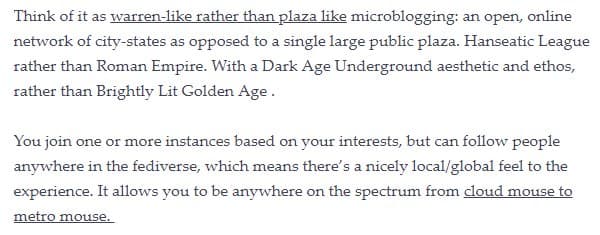🧵 View Thread
🧵 Thread (19 tweets)

Good thread, but wanted to point out that the 150 number is is from a bunch of studies that also include higher bounds of 2500 and the actual ammount is a time investment issue, not a 'wired that way' thing. https://t.co/czuzdtO5qz

You can listen to Dunbar talk about this himself here:https://t.co/Gr2FzQa7cu

This piece from 2013 has a good summary of the work, and nails the reason why I am interested in it.https://t.co/dWHkXBLrYN https://t.co/HbsACmI6iH


Even something a simple as being able to recognize faces better could be an adaptation for maintaining larger social groups.https://t.co/wDmpCluRbt

I am reminded of the kind of person talked about in 'the tipping point' called a "connector" who acts as social hubs and makes "Six Degrees of Francis Bacon" possible.https://t.co/fonyJaYY7d

It would make sense some of us would specialize in relationships & gossip (reputation maintenance). Under that lens, the naive view of 150 people and cognitive limits based on time strikes me as naive view of the way we actually operate as a species.

I have a fundamental disagreement on the nature of dunbar's number and naive views of how people view networks. There's some evidence to suggest that these mental tricks we use do infact give us useful information; https://t.co/gCJVmxQWZD

I think it's far to easy to narrate the issues of social network design on the web as a problem with Dunbar like effects. If you dig into it deep enough, it doesn't seem to be the whole picture of what's going on. https://t.co/69HXxNFK3c

And we perhaps give people too little credit in our ability to adapt to large social spaces. I think the issue is that we see manifesting are limits in social networking designs that basically force everyone to be all in the commons.https://t.co/o6Ni0HPFgb

We're on a social networking platform where I can tweet at the president of the united states in the same way that I tweet to my little brother. At a fundamental level tweet visibility is basically binary. https://t.co/oBKsPOfV9y

This isn't some dunbar number limitation we are experiencing. The symptoms we feel are thru bad social network design. An artifact of a platform being built on top of the phone system's ability to sms anyone at a moments notice.TL;DR: we don't have local phone books anymore.

Reddit's format got some of this right - the idea that communities of people revolve around various watering holes. But at some level, the incentives behind the platform pervert this dynamic.https://t.co/NKGndiIMFO

And in a similar way, we see the same dynamic here on Twitter.https://t.co/NywYrWHpkR

Twitter is a mall pretending to be a public commons.They invited in a bunch of people to make it look busy.Opened up a bunch of stalls and started charging rent.Gave out bluechecks to showcase celebrities.Then started policing the mall rats who made communities here.Get out.

Which is just an pubic facing version of the same mess Facebook is in.https://t.co/godq9JLQWc

It falls into the same trap that Facebook does. In twitter's infinite demand for growth, it mix-maxes toward Girardian status signaling. It optimizes for politics, for hot takes, for showing you things to get you engaged. That get you enraged. Screaming.https://t.co/aR9gPZymLK

The only thing I've seen that doesn't have this effect is the Fediverse.https://t.co/fyRwPswUp2 https://t.co/RIABENbF1u


We still get the same hivemind effects there as we do on Twitter or Reddit. But at some fundamental level it stops being about the network and more an artifact of the nature of celebrity. More importantly, it seems more resistant to that kind of thing.

There seems to be a huge difference between a megaphone like platform we have on Twitter: geared toward wide reaching visibility, celebrity announcements and brands; and how the Fediverse is structured for relationships and communities.

And by user account metrics on this self-report based collection, we're at 2million users there. https://t.co/KHzT2PmUV3I don't feel overwhelmed.

Overheard some interesting comments about setting up social networks using assumptions stemming from Dunbar's Numbers and his research.It prompted me to rant a bit about why that isn't a good idea if done naively.https://t.co/KMB5B2b8JS

